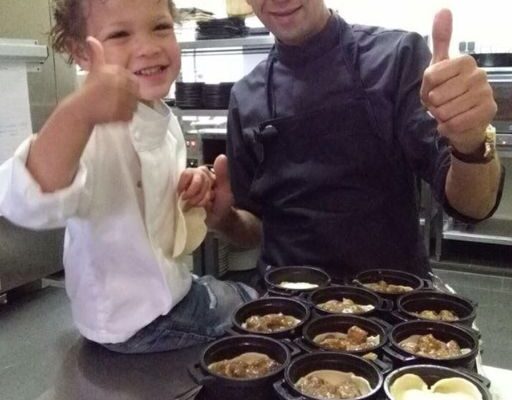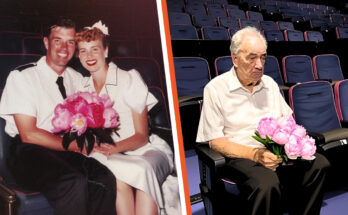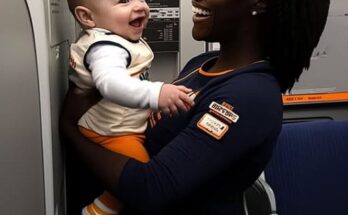I wasn’t looking to get attached. Least of all to a seven-year-old with sticky fingers and endless questions.
My kitchen was my kingdom. No distractions. No exceptions. I ran it with the precision of a military drill—timers, flames, knives, and a rhythm I didn’t let anyone interrupt. I liked it that way. People assumed I was just another stoic chef with a passion for reduction sauces. Let them think what they want. The less anyone knew about me, the better.
When Maribel, one of our waitresses, asked if her son could wait in the back after school, I nearly laughed. “This is a kitchen, not a damn daycare,” I told her, wiping sweat off my brow as I plated the day’s special.
But she looked at me with those eyes—tired, hopeful, the kind that made it hard to say no. “Just until I finish my shift. He’s a good kid. He won’t get in the way.”
I don’t know why I nodded. Maybe it was the way she said “good kid.” Maybe I was just too tired to argue. Either way, the next afternoon, he showed up—messy curls, a crooked smile, and cookie crumbs still clinging to his shirt.
“Hi! I’m Nico! Are you the boss of soup?”
I didn’t answer. Just handed him a bowl of mushrooms and said, “Wash. Twice.”
That should’ve been it. But the next day, he came back. And the next. He’d perch on the prep counter swinging his legs, watching everything, asking the kind of questions only a kid could get away with.
“Why do onions make people cry?”
“Do chefs have favorite knives like superheroes have swords?”
I never said much. Gave him jobs like peeling garlic or stacking clean plates. Mostly, he talked and I cooked. But over time, the silence between us stopped feeling awkward. He had this way of making the kitchen feel lighter, like maybe the heat didn’t always have to burn.
No one here knew anything about me outside these walls. Not the crew, not the suppliers, not even Maribel. They didn’t know I slept in a room above the bakery next door. That I had no car, no social media, no family photos. That I kept a duffel bag packed in my locker—just in case.
That envelope was in there, too. Taped beneath the lining. It held a folded birth certificate, a crumpled ID card with someone else’s face—my face, but not the name they knew—and five letters I’d written but never sent. Letters I told myself I’d burn one day but couldn’t bring myself to.
Then came that Thursday.
It was after closing, most of the crew had gone home, and I was wiping down the stainless steel when I saw it: my locker door, slightly ajar.
My chest tightened.
I opened it fully, and the lining was peeled back.
The envelope was gone.
I found Nico sitting behind the dry goods shelf, legs curled up, the envelope gripped tight in his small hands like it might explode.
He looked up at me, eyes wide. “Are you leaving?”
I couldn’t speak.
His voice dropped to a whisper. “Is someone after you?”
Before I could answer, the door swung open. Maribel’s voice cut through the tension. “Nico! Let’s go!”
He blinked up at me, then ran. He didn’t tell her what he saw. Not then.
I stood there for a long time. My hand still on the locker door. And for the first time in years, I felt…exposed.
That night, I didn’t sleep.
The next day, I asked Maribel to come in early. We sat in the break room, her arms crossed, eyes narrowed. She thought I was going to fire her.
Instead, I told her everything.
Six years ago, I did time. Armed robbery. Stupid mistake, one of many. A friend—no, a brother—owed money to the wrong people. I thought I could fix it with a knife and a mask. I didn’t even make it to the street before the sirens caught up. I served three years. When I got out, no one wanted to hire me. Not with my name on the record.
So I changed it.
I told her I wasn’t proud, but I wasn’t hiding anymore. That envelope was just a backup. Something I kept to remind myself how far I’d come.
She didn’t speak for a long time. Just stared at her coffee cup.
Finally, she said, “You saved me more than once, you know. Letting me work extra hours, covering when I had to pick up Nico early. You didn’t have to tell me any of this. But you did.”
I nodded. “He saw the envelope. I didn’t want him to think I was a villain in some movie.”
“He didn’t,” she said quietly. “He said you looked scared. Not scary.”
We never talked about it again. But something shifted after that. Nico kept showing up. Kept asking questions. Kept peeling garlic, learning how to chop an onion without crying, how to know when the pasta water was salted just right.
And I started teaching. Really teaching. Ratios. Heat control. Mise en place. The stuff you don’t learn from YouTube.
He grew up in that kitchen. The counter that once came up to his chin eventually met his hips. He got taller, sharper, hungrier—for knowledge, for responsibility.
By sixteen, he could run the line better than half my staff. By eighteen, he had saved enough to attend culinary school part-time. I told him he didn’t need it. He said, “Yeah, but I want the paper to match the skill.”
He never told anyone about the envelope. That was our secret.
On his twenty-fifth birthday, he gave me a gift—an envelope of his own. Inside was a lease. A small storefront two neighborhoods over. A fixer-upper. Brick walls, busted plumbing, a broken oven. But it had heart. And he wanted to call it “Second Chances.”
“We could run it together,” he said. “Just you and me. No dress codes, no drama. And we hire people like you. People like I might’ve been if I didn’t end up here.”
I didn’t cry. Not right away. But when I turned the key in that new door a week later, I let myself feel it.
Now we’ve been open three years. We’ve got a full team—every one of them with a past, a story, a reason someone told them “no” once.
Here, we say yes.
Nico runs the kitchen now. I’m mostly in the back office, filing permits, prepping ingredients, sneaking tastes when he’s not looking. He still calls me “the boss of soup.”
And sometimes, after closing, we sit out back with a beer and a bowl of whatever didn’t sell that night. He’ll talk about expansion plans. I’ll nod and think about that scrawny kid who asked too many questions.
Funny how he saved me long before I ever saved him.
If you liked this story, give it a like or share it with someone who could use a reminder that second chances are real—and sometimes, they show up when you least expect them.



